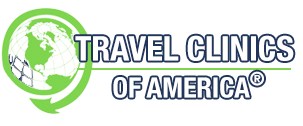TRAVEL WITH CONFIDENCE
Travel Clinics of America is your best choice for receiving high-quality pre-travel care, sound travel advice, and peace of mind.
Traveling with Children
Traveling with children brings extra excitement and additional challenges. Extra preparation and planning can make the trip more enjoyable for all.
- Children need their own passports. As of February 1, 2008, there are new requirements for passport applications for minors under 16 years old. The person applying for the passport must demonstrate that both parents consent to the issuance of a passport to the child, or that the applying parent has the sole authority to obtain a passport.
- A child departing the United States with only one parent, a guardian, grandparents, or other adults, must have written and notarized permission from both birth parents or legal guardians to enter many countries.
- Consult with a travel physician.
- Update routine immunizations and administer travel-related vaccines.
- Consider rabies vaccine if you are traveling to developing countries and planning a prolonged stay. Rabies is transmitted through the saliva of infected animals. Children are more likely to approach stray animals and may not report being bitten.
- Malaria, transmitted by infected mosquitoes, is a serious disease, especially in children. While complete protection against malaria cannot be guaranteed, avoiding mosquito bites and taking preventive medications greatly reduces the risk. Discuss with your travel physician which medication is appropriate for your child.
- Chloroquine is the drug of choice for children traveling to areas without chloroquine-resistance.
- Mefloquine may be used in infants and children.
- Atovaquone/proguanil may be used in children over 11 pounds.
- Doxycycline may be used in children ages 8 and up.
- Take steps to decrease mosquito bites.
- Stay indoors between dusk and dawn when mosquitoes are most active.
- When outdoors, have children wear protective clothing pretreated with permethrin.
- Apply mosquito repellants containing DEET (30-50%) equipment to exposed skin avoiding eyes, lips and open cuts. Wash off with soap and water when back indoors.
- Use permethrin treated mosquito netting over beds where needed.
- Traveler’s diarrhea
- Children are more susceptible to diarrhea because they are less likely to follow food and water consumption guidelines for avoiding traveler’s diarrhea. Children, especially under 2 years old, can get dehydrated quickly and are more likely to need hospitalization.
- Signs of dehydration include thirst, low urine output, dark yellow urine, no tears with crying, dry mouth, sunken eyes, and rapid pulse. Rehydrate quickly with rehydration salts mixed with safe water. You can also purchase rehydration salts in pharmacies abroad.
- Traveler’s diarrhea can be treated with antibiotics and other medications. Consult with your travel medicine provider to discuss the best options for your family.
- For severe symptoms, seek medical care immediately.
- Involve children in trip preparation. Teach them about your destinations.
- Discuss safety issues before and during the trip.
- Bring their favorite games, toys, stuffed animals, and blankets to provide comfort away from home.
- Plan activities and choose restaurants that are child-friendly.
Schedule adequate down time.
A Travel Clinics of America physician can help you prepare for travel with children. Find a local Travel Clinics of America physician to get started planning your trip!

